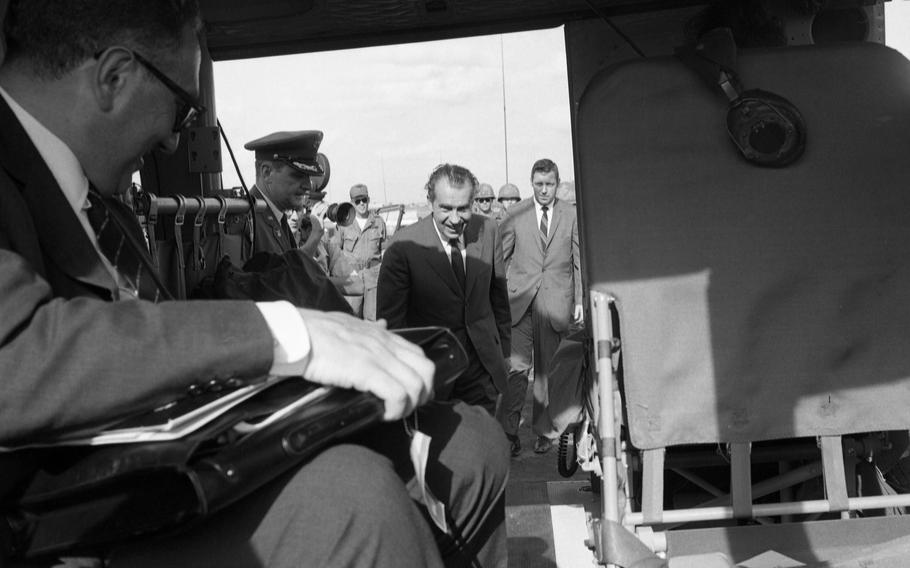Henry Kissinger visits President Richard Nixon at the White House on March 22, 1974. (Marion S. Trikosko/Courtesy of Library of Congress)
The president had been putting on a brave face for hours. Having decided to resign, Richard M. Nixon began informing senior officials. He worked on his resignation speech. His family was informed and joined him. A White House photographer came in, and the first lady tried to wave him away — now was not a good time, she told him — but the president insisted on posing for a few snaps, smiling.
But no more. Now he was in a hidden corner of the White House, sobbing in the arms of Henry Kissinger, who died Wednesday at 100. Veteran Washington Post reporters Bob Woodward and Carl Bernstein captured the scene in their 1976 book “The Final Days”: the most powerful man in the world, ruined by his own actions, held by a man whose own hold on power would be hailed and condemned in the decades to come.
Throughout his time in office, Nixon often retreated to the Lincoln Sitting Room, a small chamber next to the Lincoln Bedroom, when he wanted to be alone. Located on the second floor in the southeast corner of the mansion, it was about as far as one could get from both the residence and the bustle of the West Wing. The room held an overstuffed leather chair, a record player, a fireplace, framed portraits of Abraham Lincoln and little else.
After dinner and more meetings in the Oval Office, Nixon went to the sitting room and summoned Kissinger, his secretary of state.
According to “The Final Days,” Kissinger never really liked Nixon and was relieved he was resigning. (Woodward famously does not cite his sources in his books, including this one, but it is hard to imagine how he and Bernstein could have written this without hearing it from Kissinger himself.)
Kissinger was also angry that a “domestic scandal” had “wrecked” his foreign policy objectives, they wrote — an interesting perspective on the Watergate break-in, considering that some historians think Kissinger’s hatred of Pentagon Papers leaker Daniel Ellsberg sparked the whole thing, as national security reporter Spencer Ackerman pointed out in his scathing obituary of Kissinger.

Henry Kissinger, President Nixon’s National Security Adviser, has already taken a seat in the helicopter waiting for his boss to join. President Richard Nixon swept in and out of South Vietnam July 30th during a tour that was mostly kept under wraps as security and secrecy engulfed the Nixon trip as it began from Bangkok without advance announcement. (Jim Clare/Stars and Stripes)
In any case, Kissinger had been forming detailed plans for the transition to Gerald Ford and assumed Nixon wanted to go over those plans.
But Nixon was nearly silent, and drinking. He expressed reservations about resigning and concern for his legacy. “Will history remember me more kindly than my contemporaries?” he asked.
Kissinger said yes and began listing the president’s foreign policy achievements. Nixon began to sob.
Kissinger continued, trying to tell the president what he thought he wanted to hear, about enemies and accomplishments, but the more he went on, the more “hysterical” Nixon became.
Then Nixon said, “Henry, you are not a very orthodox Jew, and I’m not an orthodox Quaker, but we need to pray.” He got down on his knees, and Kissinger awkwardly followed. Nixon prayed out loud, asking God for “help, rest, peace and love,” according to “The Final Days.”
He went on and on, and even when finished, he did not get up from his knees. He punched the floor and sobbed, “What have I done?” Kissinger moved closer and held him like a child, in what must have been an incredible scene — the tall, tanned former high school football player curled up in the arms of the short, bespectacled professor.
Together, they had executed an ambitious and, many say, an often sinister agenda: the secret bombing of Cambodia and Laos, the pullout from Saigon, a landmark trip to China, a détente with the Soviet Union, propping up the Shah of Iran, support for Israel in a war against its neighbors, backing military coups in Chile and Cyprus, opposition to freedom movements in Bangladesh and Biafra ... the list is long.
Eventually, Nixon collected himself and returned to his chair and his drink. Kissinger tried to soothe him with assurances that his reputation would be restored, and perhaps he could become an ambassador — assurances Kissinger did not believe even as he uttered them. Once he had extricated himself, he returned to the West Wing and told his advisers what had just happened. “It was the most wrenching thing I have ever gone through in my life — hand-holding,” Kissinger said.
Soon, the phone rang. It was Nixon, now completely drunk and slurring his words, according to “The Final Days.” He asked to speak to Kissinger. “Henry,” he said, “please don’t ever tell anyone that I cried and that I was not strong.”